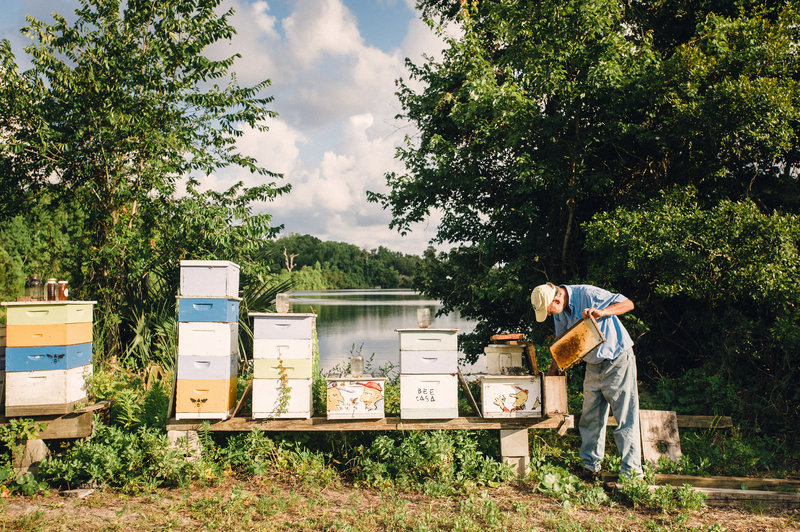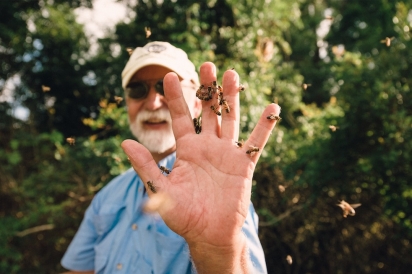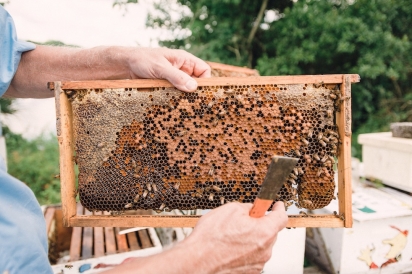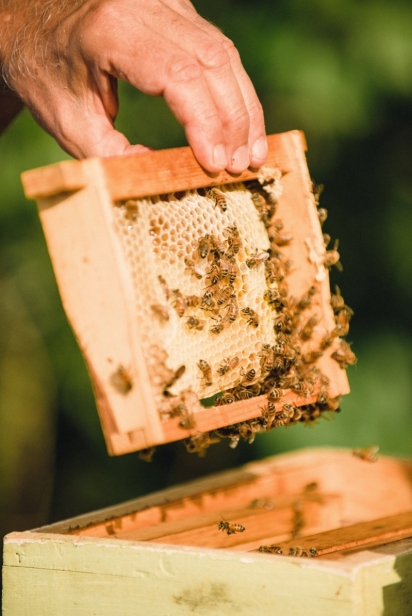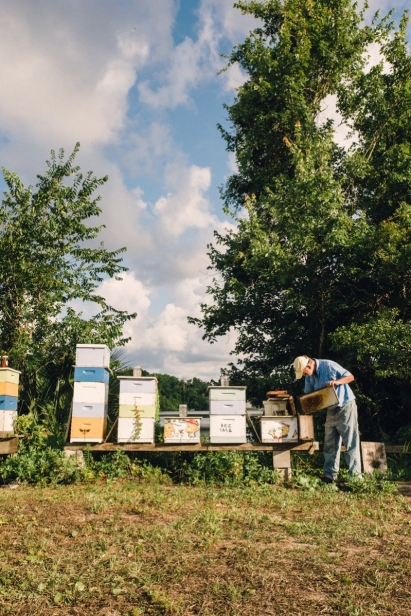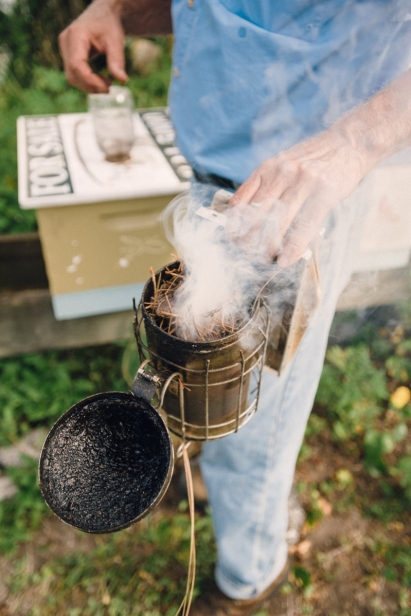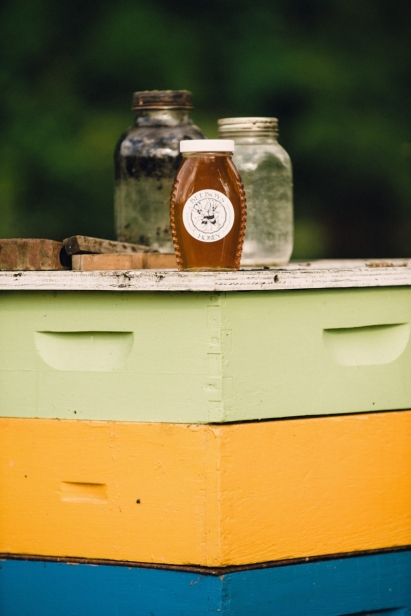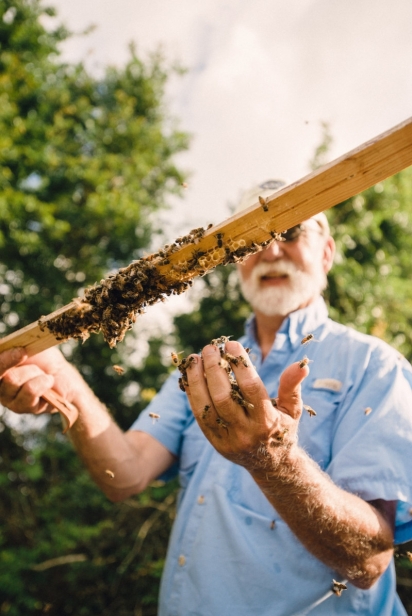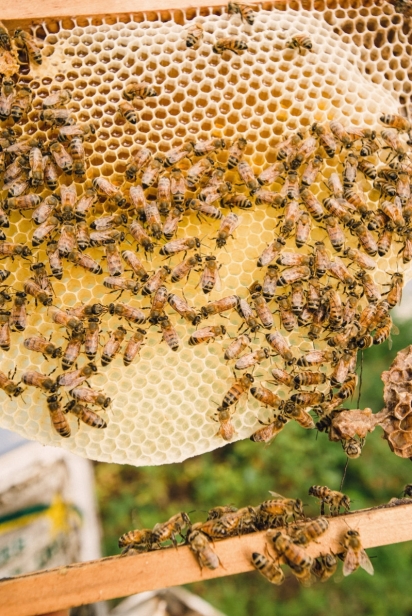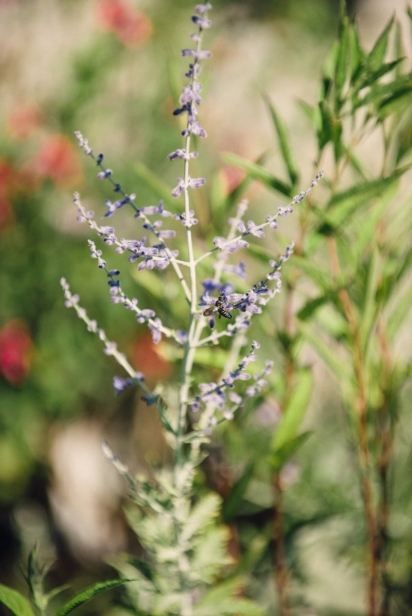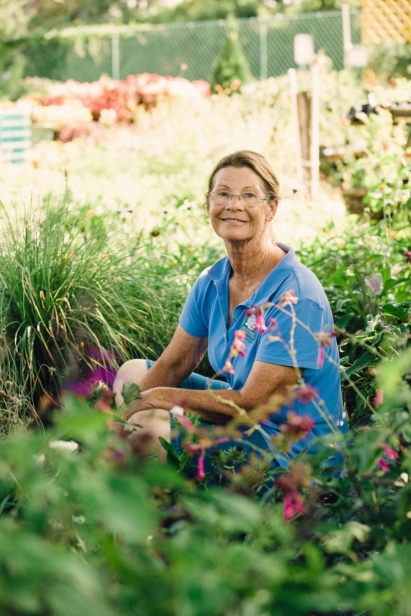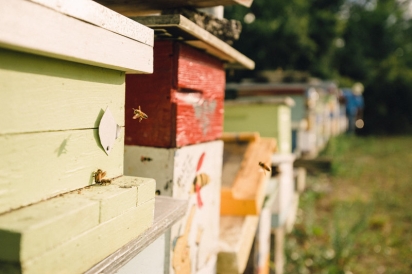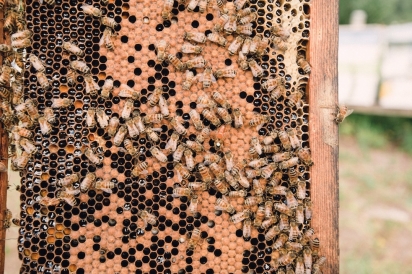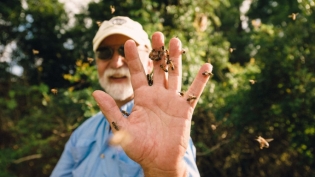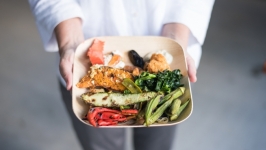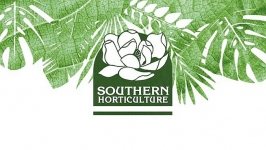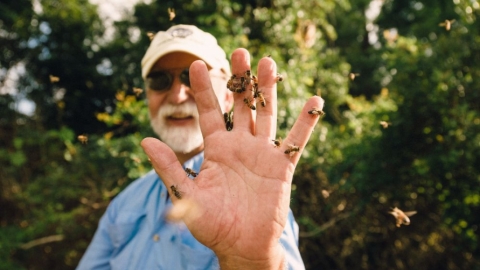Bee Here Now
Are you underappreciating honey bees? Bees, for me, have always been just kind of there. Doing their job and staying below the radar. Like my car’s tires. And my mom. Until a few years ago, that is, when news articles and documentaries featuring honey bees and a looming “bee-pocalypse” were everywhere.
Did you know one third of the food we eat comes from insect-pollinated plants, and honey bees pollinate 80% of all the fruit, vegetable and seed crops produced in the U.S.? This winged workforce is responsible for billions of agricultural dollars, and without these little farmhands our diets would be bland indeed. Many of Florida’s biggest cash crops like citrus, berries, melon and squash depend on honey bees and we are one of the top honey-producing states every year. For the past decade across the nation and world, bees have been vanishing at alarming and unprecedented rates. But do we still need to worry about honey bees today?
Colony collapse disorder (CCD), the official name of that epidemic of bee die-offs, sounds catastrophic because it is. While there is no single cause of CCD, it is instead the sum of all its parts: pesticides that confuse, maim and kill bees; monoculture farming; habitat disappearance; poor nutrition; stress; extreme weather; disease and invasive hive insects like the Varroa destructor (a nasty parasitic mite with a name more evil than a Harry Potter villain). Florida’s temperate climate is perfect for bees and while our colony losses may buck the national trend of loss between 30–40% every year, we are still susceptible.
The upside in the Sunshine State is that from commercial outfits with hundreds of hives to backyard hobbyists, registered beekeepers here number nearly 4,000 and rising.
Jacksonville resident and urban beekeeper Justin Stubblefield started his honey business when he graduated from high school. While many teenagers might covet the latest electronic device or tech gadget, five years ago Stubblefield used his 16th birthday money to buy a beehive.
Initially curious about the white wooden boxes he saw stacked on the roadside, when Stubblefield discovered they held bees, he researched everything he could on the subject. He found out his neighbors who grew vegetables needed help with pollinating, while news of widespread devastation from colony collapse disorder and other issues also motivated him.
The bespectacled youth started harvesting wildflower honey, then selling it when the inspiration arrived to fuse organic fruits with creamed honey (as a vehicle for those who may not enjoy the taste of “regular” honey). Stubbee’s Honey is now offered at markets and shops across Northeast Florida, including Winn-Dixie stores as part of their Winn-Local program.
Stubblefield obviously enjoys his work and realizes “if you’re going to do something for the rest of your life, do something you love.” He’s also quick to add, “Why not try to make it into something that gives back?”
Increasingly, younger folks are getting involved, but attend any local beekeepers meeting on the First Coast and you will see more grey hair than at a Crosby, Stills and Nash concert. Artist and educator Bo Sterk is the president of the St. Johns County Beekeepers Association, and also represents the Northeast Florida district in the state association. A master beekeeper, he began his studies 20 years ago to help a friend treat her multiple sclerosis with apitherapy (using bee products as medicine) and then got hooked.
“It’s addictive once you get going in it,” Sterk said.
The day we met at his hives in west St. Augustine, bees mostly ignored me, the interloper, and whizzed around on task as Sterk checked his hives. This was not when I got stung.
As we chatted about the hives he keeps “for research, observation and manipulation,” Sterk hustled over to a nearby tree. A bee mass the size and shape of a football had swarmed onto a limb.
Sterk stuck his hand into the swarm and instantly found the queen. He isolated her along with a couple of attendant bees in a cute little screened-in “queen box” that he grabbed from his small white pickup truck/bee office. He instructed me to reach my arm out. Then, with the speed and sleight of hand of a magician palming a card, he flicked his wrist and dozens of bees instantly covered my right hand. The entire episode lasted approximately 127 seconds, and I thought I played it pretty cool.
This was not when I got stung, either.
On this day Sterk was trying essential oils he’d heard were a good defense against Varroa mites and hive beetles. Neither of us wore veils or bee suits. He stuffed pine needles into a shiny metal smoker, squeezed the bellows and a cloud of smoke settled on top of a hive. He removed a frame and pointed out newly laid eggs, tiny as grains of rice, nestled in some of the cells.
This was when I got stung.
The first one? Tip of the nose. I bit my lip, casually backed away from the busy beekeeper (who was still working) and strolled a few steps away. Then, Boom. Side of the neck. Boom. Back of the arm.
The girls were riled up, now.
Was this immersion journalism? I may or may not have yelped, and Sterk casually offered a veil. Feeling gutless, I put it on. He put one on too, but that may have been to make me feel better.
One more sting on the pad of my left thumb as we walked away from the hives to continue our interview elsewhere on the property. That one hurt. But I persevered in the name of journalism.
Every beehive has a breeding queen and a few thousand male drones who hang around waiting to mate with her. Among the same hive the rest of the bees are female workers. In the height of the season, these industrious insect heroines are 50,000 stepsisters working for the good of the colony.
Taking jobs defined by their age, in the hive they toil as nurses, housekeepers, construction workers, royal attendants, undertakers, HVAC techs, gate guards and foragers that leave in search of nectar, pollen and water. The labor never ends for these mini Cinderellas, and there certainly is no dance with Prince Charming at midnight.
In her lifetime, a single honey bee worker produces 1/12th of a teaspoon of honey. She will only live for weeks in the busy summer months, a bit longer in the winter.
Groups like the St. Johns County Beekeepers Association are an amazing source of information for novice beekeepers and the community. They recently outgrew their meeting space and now gather at the St. Johns County Agricultural Extension Center. The organization maintains an apiary there and holds workshops and hands-on demonstrations. The Ag Center also sells honey harvested from the hives.
Beekeepers know the importance of their mission and love to share their knowledge. One thing Stubblefield tries to do when he speaks to local kids in places like the Children’s Community Garden at Jarboe Park and elementary schools is perform a “cleanup act for the bad impression bees made.” He takes a few minutes to clear the air of bee-related fears and previous misconceptions.
Sterk and the St. Johns County group do similar kinds of outreach. Involved with the University of Florida Honey Bee Research and Extension Lab, Sterk periodically travels to the Caribbean to consult and help establish best bee practices. He wrote a comprehensive manual for beekeepers in Haiti and has been involved in UF's Bee Lab's Bee College (held every year at sites throughout the state and the Caribbean).
If keeping bees is not an option for you, there are other ways to further their cause.
Kim Robertson circled the plant yard at Southern Horticulture in St. Augustine. She patiently pointed at herbs, annuals, perennials and shrubs that appeal to bees. As we spoke, dozens of honey bees worked the colorful blossoms of the nursery’s plants, the pollen baskets on their legs laden with bright yellow pollen.
“All you need is a four-foot patch of flowers and it will attract them,” she said. She added that providing fresh water in shallow dishes is helpful too. Bees not only drink the water, they use it to cool down hives when it is hot.
Robertson is a master gardener and has worked at this organic nursery and garden center for 10 years. She began beekeeping four years ago when her avocado tree was not being pollinated. Now with nine hives at her home in south St. Augustine, she gives talks on bees and the plants they love for credits toward her master beekeeper certification. She also serves as a board member of the St. Johns County Beekeepers Association.
“We’re constantly trying to bring more information to the public,” Robertson said.
The next time you see a bee, remember to give it a nod of thanks. Even if honey is not (in) your cup of tea, surely you enjoy eating something bees pollinate. We cant afford to underappreciate our bees. We need them and they need us. So be a hero. Make Bees your friends.
Photography by Kristen Penoyer


